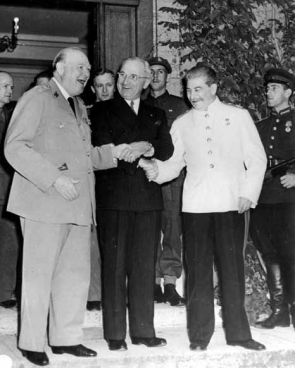"Big Three" Meet at Potsdam: On This Day, July 17
Posted by Kristin Miller on Sunday, 07/17/2016

The Potsdam Conference, which began on July 17, 1945, was the third meeting of the "Big Three," after Tehran and Yalta, to address the waging of WWII. But this time the cast was different, FDR’s death thrusting Harry Truman into the spotlight. Here, in a more jovial than usual encounter, are the representatives of the Big Three: British prime minister Winston Churchill, US president Harry Truman, and Soviet leader Joseph Stalin.
The war in Europe had come to an end with Germany’s surrender in May, and the tensions that would lead to the Cold War were already evident in the discussions about how to deal with Germany.
The major outcome of the conference, however, dealt with the continuing war with Japan. On July 26, Harry S. Truman, Winston Churchill, and Chiang Kai-shek issued the Potsdam Declaration to Japan: "We call upon the Government of Japan to proclaim now the unconditional surrender of all the Japanese armed forces, and to provide proper and adequate assurances of their good faith in such action. The alternative for Japan is prompt and utter destruction."
Learn more about the United States in World War II here in essays by leading historians, featured primary sources, and other materials available from the Gilder Lehrman Institute.